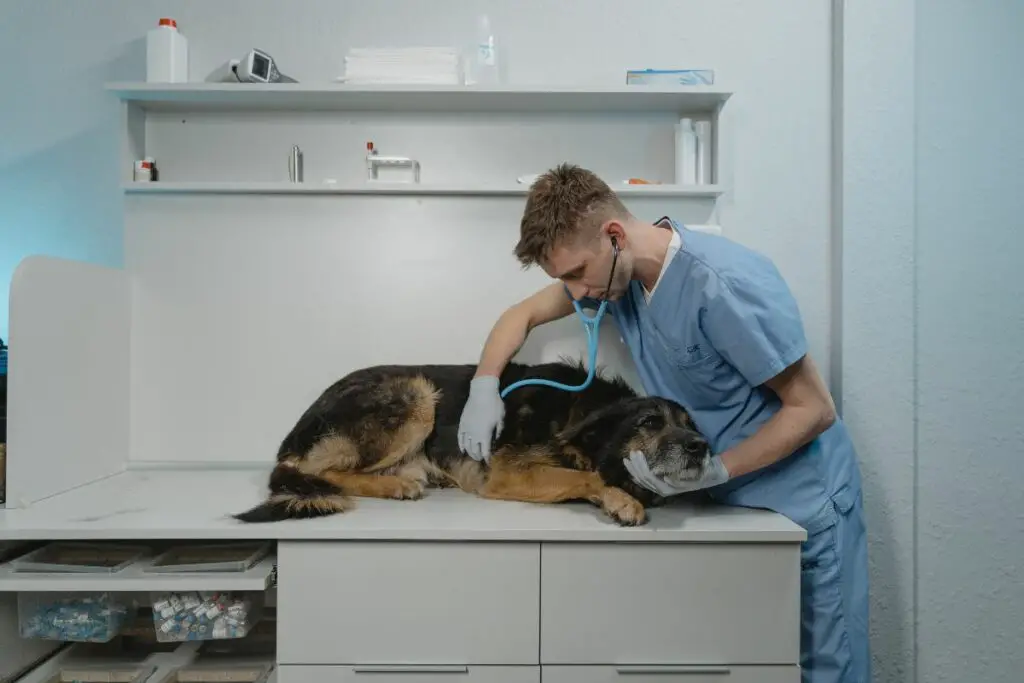In recent months, a perplexing and ominous shadow has fallen over the canine community, as a mysterious and potentially fatal dog illness is spreading across various states in America, leaving pet owners and veterinarians puzzled and concerned.
So, what are the symptoms of this mystery dog illness? And, most importantly, how to protect your dog against it?
Symptoms of the mystery dog illness include prolonged coughing, lethargy, and breathing difficulties. To protect your dog, make sure to monitor for symptoms and maintain regular vet check-ups. It’s also advised to avoid contact with other dogs who in crowded areas.
Keep on reading as take a closer look at this mysterious dog illness, breaking down the reported cases and symptoms, the latest discoveries about possible causes, and what you can do to protect your dog.
Contents
New Mystery Dog Illness: How Did It Start?

A perplexing dog illness has emerged, starting with a persistent cough lasting weeks. Veterinarians, including Dr. Lindsey Ganzer of North Springs Veterinary Referral Center, have observed an alarming trend: the illness swiftly progresses, defying conventional treatments like antibiotics. Dogs affected are left struggling to breathe, developing severe pneumonia seemingly overnight.
Dr. Ganzer’s hospital alone has encountered over 30 cases since mid-October. The situation is equally alarming in Oregon, where the Department of Agriculture has received over 200 reports since mid-August, though the exact mortality rate remains unknown.
Despite efforts, the cases show no signs of abating, with two to three new instances daily, often requiring intensive hospitalization. The Oregon Department of Agriculture is actively collaborating with other authorities to pinpoint the illness’s cause.
Overall, the veterinary community is on high alert, emphasizing the need for pet owners to stay vigilant, seek prompt veterinary attention, and report any concerning symptoms in their dogs.
Where Has the Illness Been Reported in the U.S.?
The mysterious dog illness has cast its shadow across various states in the United States, with reported cases emerging officially or anecdotally in Oregon, Colorado, New Hampshire, Massachusetts, Rhode Island, California, Indiana, Illinois, Washington, Idaho, Georgia, and Florida.
The American Veterinary Medical Association is actively monitoring these cases and maintains contact with state officials.
What Are the Symptoms of the Mystery Dog Illness?

The mysterious dog illness presents a range of symptoms that vary in severity. These symptoms include:
- Persistent coughing that goes on for over a week or so
- Nasal or eye discharge
- Sneezing
- Lethargy
- Breathing difficulties
- Purple or Blue-ish gums (from the lack of oxygen)
It’s highly recommended to seek prompt veterinary care if you notice any of these symptoms, especially if your dog has recently interacted with numerous other dogs in settings like daycares, kennels, or dog parks. Do not wait to see if the cough will go away on its own; early intervention significantly improves your dog’s chances of recovery,
What Are the Possible Causes of the Mystery Dog Illness?
Veterinarians are finding it challenging to pinpoint a singular cause for this mysterious illness, given the myriad reasons behind canine coughs.
Late developments involve researchers at the University of New Hampshire’s Veterinary Diagnosis Laboratory identifying a bacterium potentially linked to the surge in respiratory cases. The bacterium, which is smaller than usual, is novel in causing disease, raising concerns about its impact on dogs’ respiratory tracts and lungs.
However, as with any new illness, conclusive confirmation awaits further testing.
Is the Mystery Dog Illness Fatal?

The mystery dog illness has three potential outcomes.
Some dogs exhibit a mild to moderate cough lasting six to eight weeks or more, minimally responsive to antibiotics. Others develop chronic pneumonia, resistant to antibiotic treatment. The most severe manifestation is acute pneumonia, often leading to poor outcomes within a remarkably short timeframe—sometimes as little as 24 to 36 hours.
According to veterinarians who have treated affected dogs, the majority with pneumonia respond positively to antibiotics, while those with a lingering cough often recover over time without progressing to pneumonia. However, the prognosis is grimmer for dogs experiencing severe pneumonia, with some succumbing to the illness or necessitating euthanasia.
While the number of fatalities seems relatively small compared to the overall cases, the severity and rapid progression of the illness underscore its potentially fatal nature, urging heightened vigilance and swift veterinary intervention to improve outcomes for affected dogs.
Can the Mystery Dog Illness Spread?
The mystery dog illness appears to have a higher likelihood of spreading in environments where dogs are in close contact with numerous other dogs, such as daycares, dog parks, groomers, or boarding kennels.
There are also concerns about the potential for severe respiratory infections, both known and unknown, to spread in shelters. The influx of dogs into shelters, combined with overcrowded conditions, typically sets the stage for disease outbreaks
How to Protect Your Dog Against the Illness?

Protecting your dog from the mystery illness involves proactive measures. Here are some tips you can follow:
- Limit Exposure: Minimize your dog’s contact with other dogs, especially in settings like daycares, kennels, and dog parks where the mystery illness may spread.
- Holiday Boarding Caution: Avoid boarding your dog over holidays if possible, as increased interactions during this time may heighten the risk of exposure.
- Alternative Care: If boarding is unavoidable, explore alternatives like having someone come to your home to care for your dog.
- Avoid Nose-to-Nose Greetings: Steer clear of allowing nose-to-nose greetings between your dog and unfamiliar dogs to reduce the risk of transmission.
- Vaccination: Ensure your dog is up to date on vaccinations, including those for respiratory diseases like Bordetella and canine influenza, providing an additional layer of protection.
- Early Veterinary Consultation: If your dog shows symptoms or is unwell, consult a vet promptly. Early testing aids in effective treatment and containment.
- Isolation: Keep a sick dog away from others to prevent the potential spread of the illness.
- Sample Submission: If your dog is diagnosed with the mystery illness, inquire about submitting a sample to a research lab to contribute to ongoing identification efforts.
These tips are designed to provide a comprehensive approach to protecting your dog against the mystery illness, emphasizing preventative measures, early intervention, and collaboration with veterinary professionals.
Conclusion
In dealing with the mysterious dog illness affecting dogs in the U.S., the key is to be cautious and take steps to protect our furry friends
The collaboration between veterinarians, research labs, and pet owners is crucial in solving this mystery. By staying informed and taking preventive actions, we can navigate through this challenge, ensuring our dogs stay healthy and happy.

